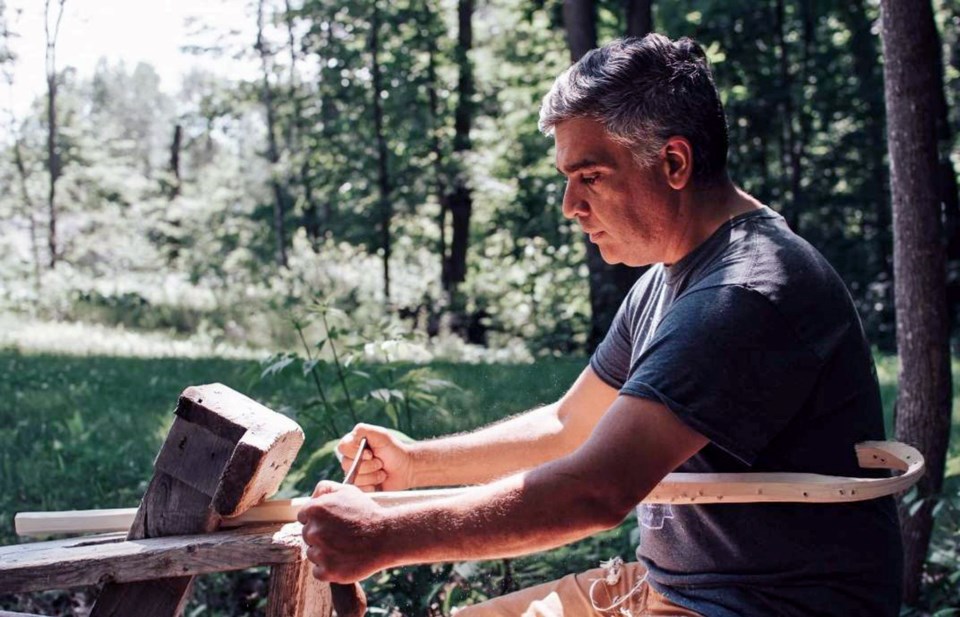YORKTON - Regular readers will know lacrosse is generally my favourite sport, a love pre-dating by years the arrival of the NLL Rush in Saskatoon, but solidified by their presence.
So, when I recently came upon the traditional wood lacrosse stick forum on Facebook, I had to join.
I was aware that the creation of wooden lacrosse sticks was highly cultural, but I wanted to know more, finally emailing stick maker Travis Gabriel who was kind enough to agree to an interview.
Gabriel is from Kanesatake, west of Montreal, part of the Mohawk Nation, and a noted stick maker. In fact, his handmade sticks were used in a re-enacted game held to mark the 150th anniversary of the sport by the Canadian Lacrosse Foundation in 2017.
While now well-respected as stick maker, it was not until 2008 he took up the craft.
“Lacrosse is very important here,” he explained, adding “. . . We were known in this community around the world as makers.”
For years the sticks of Mathew Etienne had put the community on the lacrosse map. But in the ‘90s he became ill.
“He stopped making sticks,” said Gabriel, adding when he stopped it left a void.
“It sort of felt something was empty.”
Gabriel said there had always been the seed of a thought that he might make sticks, but it wasn’t until 2008 he took the plunge.
“I picked it up on my own,” he said, adding while a woodworker, he had much to learn to create a lacrosse stick. “. . . It was a really hard process of learning on my own.”
As it happened there was a tree in the yard that was in the way of a project.
“The tree needed to come down. I didn’t want to waste it,” said Gabriel.
So the wood would become his first attempt at creating a stick.
“Sure enough I was able to do it,” said Gabriel, although he admitted the first stick was not very good. “. . . The second one went better.”
Still the craft took time to develop.
“My early sticks really were nothing to brag about,” he said, adding there is an extensive process to learn and refine to make a lacrosse stick.
It starts with harvesting the wood, allowing it time to cure, steaming to allow the curved head to be fashioned, carving to finish the stick, and of course stringing the head to create the pocket.
Gabriel said each stick takes about six months to create from harvesting the wood to stringing the pocket.
In time though the skill developed for Gabriel, to the point he realized stick making was a “good fit” for him.
“So 2008 really was an exceptional year for me,” he said.
At one time makers might have made hundreds of dozens of sticks in a year.
“There is no way I’m near that number,” said Gabriel, adding as a part time stick maker he makes a few dozen a year, although his sticks are prized.
“People seek me out. It’s something I didn’t anticipate would ever happen,” he said.
While you won’t see wooden stick on an NLL floor, Gabriel said among the Mohawk they are still used in some games.
The key is knowing how to use a wooden stick, checking with the gut sidewall, not the wood, said Gabriel.
“In our culture you play the game tough. You play the game hard, but play it fair,” he said.
Still most sticks are purchased as gifts for birthdays and weddings, or graduation.
“It’s a reminder of what the game represents in its truest form,” said Gabriel.
And as the maker, it means something special too.
“It does so much for me to make a stick. . . The process is what means a lot to me. There’s so much energy, so much history that goes into making one stick,” he said.
Gabriel added he believes that feeling transfers to the player using it too.
“It will do something special for someone playing on the field . . . The player is really playing with history.”
Gabriel said he very much at peace making sticks now.
“It really touches my heart in the context of what it means to be a stick maker,” he said.





.jpg;w=80;h=120;mode=crop)
